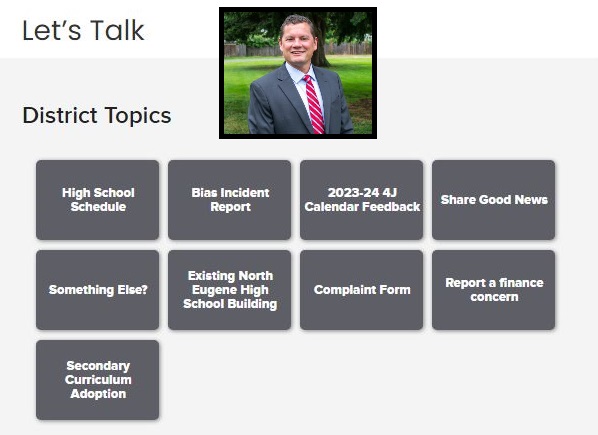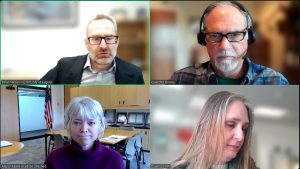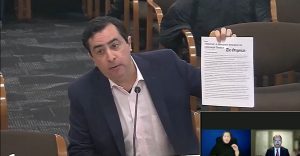4J revisits decision to eliminate equity department
11 min read
4J revisits its decision to eliminate the equity department. On Nov. 1:
Andy Dey (4J superintendent): Strong feelings have been shared from staff members and members of the community about changes to the district’s equity department. In speaking with folks after hearing those comments, it became clear to me that the changes we made left some to question, if not fear, we were possibly turning our back on the equity work that needs to be done in all aspects of this district. For that I offer a sincere and unconditional apology.
[00:00:29] Most importantly, I want to state that I hear you when you say those changes need to be revisited. I hear you when you state that the district’s commitment to equity should not be muted in any way. And I hear you when you say you feel those changes resulted in a less than full-throated commitment to equity in our district.
[00:00:46] John Q: That was Superintendent Dey on Nov. 1. On Nov. 15, he offered details about the reasons behind the district’s changes, and a road map for rebuilding public trust.
[00:00:58] Superintendent Andy Dey: Since the 2021-2022 school year (the two prior academic years), there were two director-level positions in the Office of Diversity, Equity, and Inclusion. In the spring of 2023, this last spring, the district realigned district administrative and staffing resources.
[00:01:13] Some examples of this: An intentional merger between the Student Services Department and the Instruction Department, working to embed specialized education more closely with the general education team. These specialized administrators moved to working directly for the level director of the level they support.
[00:01:30] Another key change included a senior instructional leadership role…to elevate the important work developed by the equity team and ensure it was not in a silo and instead was recognized as the bedrock of all efforts in the instruction department. Examples included the redesign of the school continuous improvement plans to ensure demographic information is no longer a predictor of student success…
[00:01:53] From November to January 2024, we’ll do community outreach with the idea that by February 2024, we would be able to utilize the information that we receive from all of our stakeholders, so that we can have a person dedicated to ensuring that we develop a diversity equity and inclusion (DEI) districtwide plan that touches on all aspects of the organization and that person would be required to oversee and shepherd that plan through, working with colleagues in the district areas, departments, schools, what have you. By the end of the year, have a full districtwide DEI plan, share that with the board, share that with the community, and update regularly on progress.
[00:02:34] We’d like to see, as examples, some increased participation in student and staff affinity groups. They are very well represented and very robust right now, but I’m sure that (as with everything that we do in education) there’s room for growth.
[00:02:43] We’d like representation reflected of students, staff, and community demographics in our ombuds onboarding process. We want to make sure that everyone who we believe could benefit from that program has the information that they need presented in a way that that will resonate with them. We’d like to see robust participation in outreach conversations, we’d like to see clear channels to support equitable access and advancement for the students and the staff of Eugene 4J.
[00:03:13] 4J School Board Member Jenny Jonak: If we’re getting community feedback that the formerly structured Department of Equity is something that the community wants or feels that it needs, is that something we will be open to revisiting?
[00:03:30] Superintendent Andy Dey: Yes. The purpose is not to go through this process to say that we went through a process and already have a predetermined outcome. That’s not the case.
[00:03:37] 4J School Board Member Jenny Jonak: Will there be any kind of interim report prepared of the feedback as it’s being collected? Are we prepared to make changes based on that feedback?
[00:03:47] Superintendent Andy Dey: The answer to both is ‘Yes.’
[00:03:49] 4J School Board Member Jenny Jonak: Is there anticipation of an effort to support retention of staff and educators of color in making sure there are safe reporting channels for them if they are not feeling safe or supported?
[00:04:01] Superintendent Andy Dey: Yes, we’ll work to ensure that there are ways in which people who feel as though they’re in a less-desirable workplace than they want to be, can, with low barriers and with confidence, speak to somebody that they know immediately, they won’t have to explain themselves to.
[00:04:19] Everybody that’s in the ‘Grow Your Own’ (teacher retention) program is part of a cohort and has a mentor. And if that’s not the case and somebody feels like they could benefit from it, please let Chemika (Bolden), let me, let your supervisor know, we’ll take care of it.
[00:04:32] 4J School Board Member Judy Newman: The presentation helped me understand more your thinking in embedding equity everywhere. But have we ever gone back and said, ‘Did something fall through the cracks? Is there something missing? Are people feeling like there’s a loss somewhere?’
[00:04:48] Superintendent Andy Dey: I think the thing that I’ve heard the most clearly is that the change in the structure of the equity team made those efforts less visible, muted in some way for folks our commitment to equity.
[00:05:03] I think many people understand that we can’t just have one department that’s responsible for equity in the district, and everybody else leaves it up to them. But having an equity department is more than just a symbol—that there is an entity and a group of people who are easily recognizable, easily identifiable, who are going to be leading that work.
[00:05:26] 4J School Board Member Judy Newman: I really like this concept. We want to make sure everyone understands it’s everyone’s role, and they’re excited about it and embrace this idea, this vision, or it will get lost. So somehow we have to bring people along to get excited and feel like we all own this. This is everyone’s work. (Exactly.)
[00:05:45] John Q: Emphasizing the need for strong listening skills:
[00:05:50] 4J School Board Member Tom Di Liberto: The complaints that I heard over and over is, hear what people are coming to them with, whether it be staff members or students, families; that they have to be great planners, they have to have great ideas, but the people involved in here have to actually hear what people want. And it’s often a skill that is difficult to define or see, superficially. But for me, that’s the most important piece of this.
[00:06:20] 4J School Board Member Morgan Munro: Sometimes when organizations enter a listening and planning phase, their response to folks is, ‘We can’t get started yet, our plan isn’t done.’ I want to confirm that in a listening and planning phase, the things that are obvious and the things that are known and the work that needs to continue are going to be continuing, because I think there were quite a few things that need to keep in motion, and that folks already know need to be part of that plan. And it’s a lot of work to listen and plan and do at the same time. But it’s also imperative that that happens. So I wanted to get your take on how you see them working together, because it’s a lot to move forward all together.
[00:07:00] Superintendent Andy Dey: Sure, and I’ll make an attempt and you tell me if I miss the mark. It’s not as if we’ll stop working to support affinity group coordinators and the work that they do with affinity group advisors and affinity groups in schools. We’ll continue to do that. Same with regional equity managers in our Grow Your Own program, with some community engagement events that we already have planned. Those are not going to stop until we get a full plan.
[00:07:24] We will continue to do those things as we go through this process, and use that information to enhance what’s already in place moving forward.
[00:07:34] We’re really in the planning phases for the next academic year, very early in terms of programmatic planning, staffing planning, budgeting planning. It will be very helpful to do this now so that as we approach the hiring season, as we mobilize our resources, we can do so given the feedback that we’ve heard in this particular area.
[00:07:56] 4J School Board Member Morgan Munro: We’re figuring out what will happen next year, but also I think we and your team knows and hears about the challenges that are being faced this year. And so those efforts to address what can be addressed this year aren’t going to be put on hold while people are listening—I want to confirm that.
[00:08:15] Superintendent Andy Dey: Confirmed. We do not intend to contract service delivery or opportunities as we go through this process.
[00:08:23] 4J School Board Member Rick Hamilton: What I’ve seen in a lot of programs is that an institution or an entity will start a diversity or a DEI program or committee or a board and they let it run and then there’s no direct oversight. There’s no reporting. There’s no communication.
[00:08:44] And most importantly, a lot of times they don’t do follow-up, up-to-date training. And it gets old and stale and then it dies and the next thing you know, they get rid of it, because it no longer appears to be successful.
[00:08:57] And so I would just caution: Once you start something like that, you want to make sure that whoever’s overseeing it, they’re getting current, up-to-date training, because in diversity, that stuff, it evolves quickly and it changes.
[00:09:11] And also, hopefully, there’s a support mechanism for, especially, your marginalized folks who are involved in that program, that they have support, ongoing support, and they feel that they can communicate when they have issues.
[00:09:31] 4J School Board Chair Maya Rabasa: I’m seeing growing conversations where parents are actively encouraging other families to consider other options for their students. But I just want to make sure that when we talk about retention that maybe we expand the conversation beyond staff to also include our students as well.
[00:09:48] I know that we look at the numbers of folks who leave our district and we often talk, think about, like, who’s leaving to be home-schooled or other things, but I think it would be interesting to start thinking about who’s leaving, maybe from all the different affinity groups, for example, we can use those categories…
[00:10:05] We’ve been talking about exit surveys forever and a day, and it’s my understanding that we offer them, and when people participate, we get some information. Do the exit surveys get analyzed in a way where we can identify patterns? Is the board ever given any information about those patterns, that they are analyzed in that way?
[00:10:26] I understand we probably wouldn’t be given access to individual exit surveys, but I’m wondering if we’re using them to pinpoint repeated issues that arise that lead to people leaving the district, and if we would have access to that sort of information.
[00:10:42] Andy Dey (4J superintendent): If the board would vote to have a presentation on that, then we can give you a presentation on that. We wouldn’t by standard practice bring it to the board to take up valuable time for business. But upon request, we could.
[00:10:58] 4J School Board Chair Maya Rabasa: I think I’m feeling hyperfocused on retention, and partly it’s because of the cost to our districts, both in terms of representation, but also, for years 4J received the bonus for having a certain percentage of our staff having had a particular number of years under their belt. And now we no longer receive that bonus because we have less teachers that are considered experienced teachers. So that’s another one of the reasons that I’m thinking about this.
[00:11:29] And I’m wanting to also make sure that in these conversations, we’re thinking about the folks who are currently working on restricted licenses. I think we have something like 40 folks on restricted licenses. And that’s an important group for us to be putting a lot of attention into supporting, partly because those are folks that we want to move into permanent positions, hopefully, and if they’re not supported, we’re going to lose them.
[00:11:58] Also, it sounds like there’s a reasonable number that are doing so in the capacity of serving as special education teachers. And we heard tonight, we hear regularly about the need for making sure that our special education teachers are well-supported. There’s a shortage across the nation in special education teachers, so if we’ve captured them as a captive audience, as a restricted licensed teacher, I’m really hopeful that we reach out to them and find out how we can support them and not wait for it to impact a plan, but what’s happening now, what can be done to make things better.
[00:12:33] And the last group that I’m thinking about that comes forward, but not quite as often, but with some pretty heart-wrenching stories is our disabled staff members, who feel as though the accommodations that they would like to receive in order to optimize their performance and their work with students aren’t always achieved. So I’m really hoping that we can incorporate that side into our conversation in this plan-building.
[00:13:00] And then the last part is a question. The town halls that we’re having with our students, families who are receiving special education services that are coming up: Is the information that we glean from those going to be incorporated into this feedback?
[00:13:19] Andy Dey (4J superintendent): Yes, where appropriate. I think that’s a way to open channels of communication to provide information to families, that we know prior families have said they wish they had at certain times. Undoubtedly, we’ll get things that will help us make better decisions. Absolutely.
[00:13:37] 4J School Board Member Ericka Thessen: I just want to second just exactly what Maya just said. I think that that’s important because: Why are students leaving the district if it’s not because they’re moving or something? But why also are students feeling unsupported in what we can offer in the district?
[00:13:53] 4J School Board Member Jenny Jonak: I’m just going to say that I really appreciate your bringing up staff, disabled staff, and the importance of doing everything we can to recruit and retain because for our disabled students, that is a huge, huge value in having people who first-hand understand their experience.
[00:14:11] John Q: 4J says: Let’s talk. As the Eugene school district revisits the decision to eliminate its equity department, students, staff, and community members are invited to share their thoughts.






